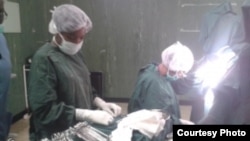Obstetric Fistula, a serious internal organ injury, continues to affect many poor women in Africa.
According to the World Health Organization, an estimated 2 million young women are living with untreated obstetric fistula in Asia and Sub-Saharan Africa.
The medical condition is sustained by women during child birth and can lead to bladder and skin infections, kidney disorders and at times death, if left untreated.
Zimbabwe has over the years seen a rise in the number of women with the condition. Some have lived with the condition for years resulting in rejection by their husbands and death in some cases.
But with the Women and Health Alliance International through its continued campaigns in the country, many women in Zimbabwe are smiling at last because the organization has been conducting fistula operations, bringing to an end years of agony in some of them.
The United States-based Fistula Foundation is also involved in the program, focused on targeting women who find themselves unable to receive adequate treatment for the condition.
Ethiopian-based fistula surgeon Dr. Ambaye Wolde Michael of WAHA performed fistula surgeries on nearly 20 women over the week at Parirenyatwa Hospital in Harare, marking the 3rd campaign in Zimbabwe.
SUCCESS STORIES
The stories of women who streamed into Parirenyatwa were endless, but many of them in need of the surgery for their treatable condition.
Josephine, a Zimbabwean woman, was among the women who were assisted this week. She had lived with her obstetric fistula for 28 years, and like many other women was ostracized and left by her husband after receiving the injury through child birth.
A 58-year old woman was also among those who were operated on after living for decades with her condition.
Among those set to be operated on was an 8-year old victim of abuse, who was thought to have a fistula due to the injuries suffered from her abuse.
WAHA officials were able to confirm that the young girl did not have a fistula, but they say it was a major step in assisting the young girl who was suffering from the trauma of abuse.
Others were young girls aged 18 to 20 who had lived with their fistulas for a few years after suffering the injury during childbirth.
FISTULA EFFECTS
For many women an obstetric fistula is life altering, and many of these women are young girls in their teens. The most prominent effect of a fistula is the constant leaking of urine and feces as a result of the internal injury.
Andrew Strang, the regional coordinator of the Women and Health Alliance International, said the women end up living isolated lives.
“The smell is inescapable after a while, they try not to drink water because it leaks more but then when you dehydrate yourself it just makes the urine more concentrated.”
Strang added, outside of the physical effects of the condition, women are left to deal with the social and psychological effects.
“They are deemed to be cursed in the rural areas, there is a perception that they are cursed or that somehow it’s related to a curse and the husband will very often in most cases will leave and they will often just end up staying with a family member,” said Strang.
WAHA plans on continuing its campaign in Zimbabwe with operations by Dr. Wolde Michael in the country. Outside of Zimbabwe, WAHA performs similar surgeries for other women throughout Africa and Asia.




